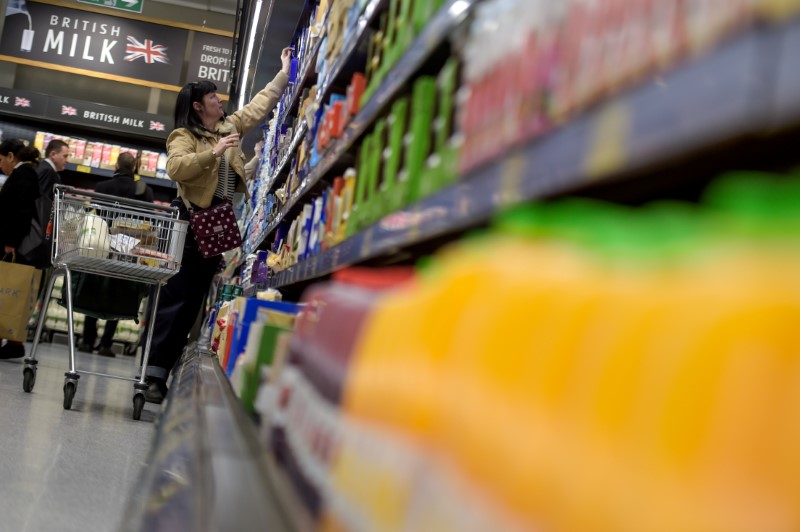By William Schomberg and Andy Bruce
LONDON (Reuters) - Britain's inflation rate picked up in July for the first time this year, leaving many British households feeling squeezed by prices that are rising at about the same pace as their salaries.
Official data also underscored the weakness in the property market since the 2016 Brexit vote, with prices in London falling at their fastest pace since 2009.
Overall, consumer price inflation rose at an annual rate of 2.5 percent in July after holding at 2.4 percent in the previous three months, the Office for National Statistics said, in line with economists' forecasts in a Reuters poll.
It was the first time since November that inflation gained pace, slowing the recovery in spending power for many households, even if inflation is expected to fall back in the coming months.
"These figures show that the cost of living squeeze is not yet a thing of the past," said Tej Parikh, an economist at the Institute of Directors, an employers group, noting high oil prices and a rise in utility bills.
On Tuesday, data showed average earnings, including bonuses, rose an annual 2.4 percent in the three months to June, extending a long run of pay rises below their pre-financial crisis levels.
"This is likely to weigh down consumer spending, posing fresh problems for embattled high street businesses," Parikh said.
On Tuesday, Homebase, which sells DIY goods, became the latest casualty among retailers struggling to cope with a tougher market -- as well as the rise of online shopping -- saying it would close 42 stores.
When the Bank of England raised interest rates this month, it said inflation would rise to 2.6 percent in July before weakening. It expects inflation will be just above its 2 percent target in two years' time as it slowly raises borrowing costs.
But many private economists think inflation will prove to be weaker than the BoE is predicting.
Sterling, which has fallen in recent weeks on concerns about the lack of an agreement on Britain's leaving the European Union and the signals about how gradually rates will rise, briefly fell after Wednesday's data.
The CPI hit a five-year high of 3.1 percent in November, when the inflationary effect of the pound's tumble after the Brexit vote reached its peak.
OIL PRESSURE
Prices for computers games -- which are often volatile -- and transport fares pushed up inflation in July. Prices for clothing fell. The removal of initial charges for investment in some unit trusts also held inflation down.
Another measure of inflation, the retail price index, rose by 3.2 percent, its weakest rise since March 2017, offering a little bit of relief to rail travelers -- many annual ticket price increases from January will be set by that reading.
There is some pressure in the pipeline for consumers. The cost of raw materials for manufacturers was 10.9 percent higher, the biggest annual rise in over a year, reflecting an increase of more than 50 percent in oil prices.
Manufacturers raised the prices they charged by 3.1 percent, weaker than June's 3.3 percent but slightly above the forecast in the Reuters poll.
House prices in June rose by an annual 3.0 percent across the United Kingdom as a whole, the weakest increase since August 2013.
Prices in London alone fell by 0.7 percent, the biggest fall since September 2009, during the global financial crisis.

Other measures of house prices have also slowed to about half the rate before the Brexit vote, a slowdown caused by a combination of record high valuations, the squeeze on spending power and uncertainty about Britain's relationship with the European Union.